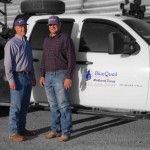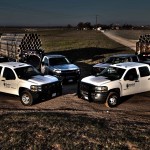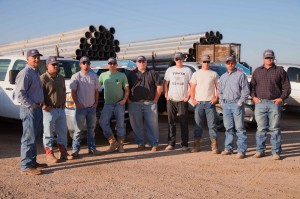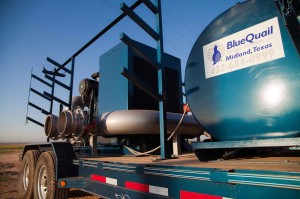Source: http://pboilandgasmagazine.com/profile-mark-machen-president-of-blue-quail-water-transfer/
In an industry that is chock full of dizzyingly complicated technological  processes and procedures, there’s something somehow gratifying in contemplating a trade that anyone can grasp.
processes and procedures, there’s something somehow gratifying in contemplating a trade that anyone can grasp.
The business of “water transfer” fits that description. It’s an essential task—a veritable “from Point A to Point B” logistic—but it calls for professionalism and its own unique set of efficiencies and economies.
Water transfer, though it may have been around for a long time, has become an increasingly valuable service, as well as an increasingly prevalent service, as hydraulic fracturing has become an increasingly prevalent practice.
And one of the newest players in the water transfer field could be thought of as emblematic of the enterprising spirit that has infused the industry as new opportunities have sprung up in the energy world—especially in the Permian Basin. Blue Quail Water Transfer affords a good example of a startup that answers the call for entrepreneurship and energy.
 Blue Quail’s leader and president, Mark Machen, is himself emblematic of this new opportunity-driven spirit of responsiveness and adaptability.
Blue Quail’s leader and president, Mark Machen, is himself emblematic of this new opportunity-driven spirit of responsiveness and adaptability.
Machen is a study in adaptation, having made the career switch from telecommunications to the oil field. His story hints at the tremendous pull currently exerted by oil and gas for qualified individuals. Moreover, as the Permian has boomed, its needs have broadened. Not just for greater numbers of professionals, but for more diversified skill sets as well.
Will Lunsford saw that in Mark Machen.
 “He’s a great guy,” said Will Lunsford, who is a minority owner in Blue Quail Water Transfer, as is Machen. “He was running Grande Communications. He built it into a really great organization. We were after him for quite a while—wanted him for his integrity and his confidence and work ethic.”
“He’s a great guy,” said Will Lunsford, who is a minority owner in Blue Quail Water Transfer, as is Machen. “He was running Grande Communications. He built it into a really great organization. We were after him for quite a while—wanted him for his integrity and his confidence and work ethic.”
While those traits were clearly valuable, the question still had to be asked, why look outside the industry for management?
“The market is open to new entrants,” Lunsford said. “We are in an environment where, at least temporarily, demand is outpacing supply. If we can go out and find some guys for the operations side—guys who align with us from the integrity set, who can execute on the technical side, well, we can get involved in business in a more robust fashion, and achieve some margin expansion. Mark was the first guy we called to make that happen.”
Lunsford said that the individuals for whom he works are Moriah Group, and that they are the majority owners of Blue Quail Water Transfer. Lunsford himself is chairman of Blue Quail, and he also serves as president and CEO of Moriah Energy Services.
Lunsford joked that Machen was plucked “from a job where he was being paid a whole lot to do a lot, to a job where he was being paid not near enough to do a whole lot more.” He laughed. “And we didn’t tell him that until he’d signed on the line.”
He added that he and Machen grew up in rival school districts (Olney [Lunsford] and Seymour [Machen]), and although the two didn’t know each other back then, they were about the same age and they played ball against one another. “So it turns out that an ol’ Olney boy pulled one on a Seymour boy,” he quipped.
Meanwhile, the Seymour boy is finding his place in a field—water transfer—that can accommodate new entrants into oil and gas—or anyone with a strong work ethic and a desire to grow and prosper.
Machen explained the process:
“The operators build frac pits on ranchers’ lands and they also drill maybe three or four water wells,” he said. “Those are to fill the frac pits so that they’ll have the fresh water needed for fracking.”
The need for water transfer arises when the frac pits are a considerable distance from the well, as often they are.
“The well location might be two or three miles from the frac pits,” Machen said. “We have 10-inch aluminum pipe that we lay on the ground [transfer pipelines are above-ground] from the frac pit to the new well location.”
The process also calls for pumps, which Machen and his team transport and set up. Pumps are put in place at the frac pit, and if the distance to be covered is sufficiently lengthy, some in-line pumps are inserted into the run as well.
Then the well water is pumped from the frac pit to the well site, where it fills frac tanks that are already in place for the hydraulic fracturing process that is soon to begin.
The pressure pumping company—a different team—joins the process at that point and they pump the water downhole (mixed with sand and frac fluids) to perform the frac job.
Machen brings a formidable skill set to his new trade. His role in telecommunications was no ordinary one. As recently as January, he was still serving as general manager of Grande Communications, the cable television and internet service provider in the Midland/Odessa region. Further, his responsibilities there extended to several other large markets as well, for he was in charge of the company’s operations in Corpus Christi, Waco, Austin, and San Antonio. Some 350 people reported to him.
Now only a handful do. But they’re growing.
As for his telecommunications career, Machen is philosophic.
“I’d been in that business 27 years, and really, to take another step beyond a vice presidential title, I probably needed to move back to a larger metropolitan area,” he said. But we [he and his wife] like Midland/Odessa. After we moved here, my wife decided this was home.
“I have an entrepreneurial spirit in me, and I felt it was time to look at what opportunities we can find here in Midland.”
The couple moved to Midland about 13 years ago, when Machen began to build the Grande presence there.
It’s only been within the past year that Machen has been an active professional in the oilfield services industry. Blue Quail Water Transfer became a reality in December 2011.
Not that the company was without experience. Its vice president, Tye Edwards, has years of experience in the field.
Machen and Edwards met when Machen was making a practice of “just going out and talking to guys I knew, or having breakfast or lunch with them, as I tried to learn what’s out there in the oil and gas field. I met a lot of people who encouraged me in many ways, and one of those people introduced me to Tye.”
They hit it off, and Machen tapped some of his other professional contacts as the Blue Quail project began to come to fruition.
“I felt that water transfer was a good place for me,” he said. “We put a business model together and raised a little equity and then went out and raised our funding. Then we purchased our equipment—pumps, trailers, pipe, etc. And we started picking up the phone and placing calls to prospective customers. We were doing jobs by February.”
In December it was just himself and Edwards. Now a full team is in place. And their business more than doubled between February and May.
A typical job takes anywhere from one to five days.
“The pressure pumping company is always taking water out of the frac tanks to frac the well. We maintain rate and flow to those tanks. That way, when one stage is completed, the tanks are ready and full for the next stage.”
Some of the companies who have utilized Blue Quail are Berry, Laredo, Resolute, Atlantic, and Chesapeake. Their field of operations, so far, has been well sites in Glasscock County and Reeves County, as well as some work in New Mexico.
Duncan Butler, managing director for Centennial Investments, calls Machen one of the easiest people to business with that he has ever encountered.
“I have worked with Mark for going on 15 years and if I were ever forced to work with just one person for the rest of my life, he is the person I would pick,” Butler said. “He’s great with people. He actually listens to employees and people. He’s great at figuring out how to make things work for people. He’s one of the most efficient managers of people I’ve ever had the pleasure to work with.
Butler said that about 15 years ago he (Butler) had a company (Multi Technology Services [MTS]) that was in a distressed situation. “There were some bad dealings among senior management and I had to turn to mid management to address the issues. That meant I had to trust someone I didn’t know well.”
Machen, it turned out, was that person. And Machen came through for Butler. “He is a good man,” Butler said. “He has done nothing but exceed my expectations.”
Cary Brown, chairman, CEO, and president of Legacy Reserves LP, feels likewise.
“I like him a lot,” Brown said. “We’ve gone to church together a long time. His kids and my kids went to school together. He does what he says he is going to do and is a really good problem solver.”
As for the business of water transfer, Brown deems it “a growing field—as long as rig counts continue to grow and as long as they keep doing multi-stage fracs.”
Asked where he sees things going for Blue Quail, Machen said that they will continue to establish their identity as a company and to grow their customer base and to solve customer needs, but they also hope to add more products and services.
The outlook for water transfer companies and other service industries is strong, Machen said. “That is obvious from the amount of oil field service activity around town and the increases in traffic around town, as well as the challenges of [he laughed] getting a seat in a restaurant or booking a hotel room. We’re even seeing a housing shortage. But all of these things are great problems for all of us to solve.”
One of the fun aspects of being part of an entrepreneurial startup came for Machen when things were barely under way and a call came in from a customer needing another job done, and done quickly.
“That’s when that spirit kicks in,” he said. “You can forget about job titles then. Everyone [himself included] gets to pull their bootstraps up and actually lay pipe. We’re all out there, laying pipe, setting pumps, and getting ready for the next frac job.”
And there are other satisfactions as well.
“What I have found very intriguing is the hospitality of the oilfield industry. I have found when I make a sales call that these company folks are extremely gracious. They will take your call, they will meet with you… in changing industries from one to another, I have found a good West Texas spirit.”
Water, Water Everywhere
As this graphic indicates, the amount of water used in oil and gas operations is a small fraction of the amount consumed by all sources. Machen emphasized this point when he discussed the volumes of water that he and his peers must move to complete a frac job. From the standpoint of one well, it is a huge amount of water. From the standpoint of total human usage, it is a relatively small amount.
He shared some figures he has used in some of his conversations: A frac stage is roughly 5,000 barrels to 15,000 barrels of water. A well can have anywhere from 2 to 20 frac stages. An average vertical well calls for approximately eight stages. An average frac is 6,500 barrels.


